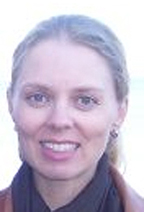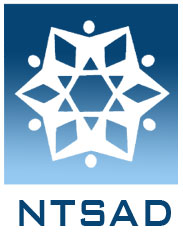Finding Your Philosophy of Care
Powerful Patient, 2009 Week 17
Host: Joyce Graff, http://powerfulpatient.org, editor@vhl.org 800-767-4845

Kim Crawford Kubilus |
Kim Crawford Kubilus, Director of Member Services at the National Tay-Sachs & Allied Diseases Association (NTSAD) joins Joyce for a discussion of treatment and end-of-life decision-making for terminally ill children.
About Our Guests
Kim Crawford Kubilus is Director of Member Services at the National Tay-Sachs & Allied Diseases Association.
Bonnie Davis lost her son Adam to Tay-Sachs on August 28, 2001. She is an active member of NTSAD serving on the Conference & Development Committees as well as mentoring newly diagnosed families.
Rhonda DuVall lost her son Nicholas to Tay-Sachs on July 12, 2000. Rhonda is a hospice nurse for Cass County Memorial Hospital in Iowa. She has volunteered her skilled loving care in the Affected Childcare at several past NTSAD Family Conferences.
Blyth Lord lost her daughter Cameron to Tay-Sachs on May 9, 2001. Blyth and her family founded the Cameron and Hayden Lord Foundation, an NTSAD Affiliate. Blyth has spoken at many past NTSAD Family Conferences about the importance of each family developing their own personal philosophy of care, care goals and care values.
Julie Rabinowitz’s daughter Emma has Tay-Sachs and will be 5 years old next month. She serves on Hackensack University Medical Center Pediatric Palliative Care Steering Committee to develop universal program throughout hospital.
Bea Zimbalist lost her daughter Jane to Tay-Sachs on November 15, 2008. Hospice provided Jane with skilled, compassionate family-centered care which allowed the family to focus on loving Jane.
About Your Philosophy of Care
The attached information is provided by NTSAD. It grew out of a series of discussions about managing the symptoms of affected children at the Annual Family Conferences of NTSAD. This thoughtful document is one example of the benefit of families talking with one another, sharing ideas, and learning together.
About Tay-Sachs
Lysosomal storage diseases (LSDs) are a group of approximately 40 rare inherited metabolic disorders that result from defects in lysosomal function. Lysosomal storage diseases result when a specific organelle in the body's cells – the lysosome – malfunctions. Tay-Sachs was the first of these to be described. See http://www.ntsad.org/S02/S02storage_diseases.htm
Like other genetic diseases, individuals inherit lysosomal storage diseases from their parents. Although each disorder results from different gene mutations that translate into a deficiency in enzyme activity, they all share a common biochemical characteristic – all lysosomal disorders originate from an abnormal accumulation of substances inside the lysosome.
Lysosomal storage diseases affect mostly children and they often die at a young and unpredictable age, many within a few months or years of birth. Many other children die of this disease following years of suffering from various symptoms of their particular disorder. The symptoms of lysosomal storage disease vary, depending on the particular disorder and other variables like the age of onset, and can be mild to severe. They can include developmental delay, movement disorders, seizures, dementia, deafness and/or blindness. Some people with Lysosomal storage disease have enlarged livers (hepatomegaly) and enlarged spleens (splenomegaly), pulmonary and cardiac problems, and bones that grow abnormally.
About NTSAD
National-Tay Sachs & Allied Diseases Association (NTSAD) works to treat and cure Tay-Sachs, Canavan and related genetic diseases and to support affected families and individuals in leading fuller lives. NTSAD funds research, and helps to provide families with compassionate care and support. For additional information, see http://www.ntsad.org
NTSAD provides a variety of Member Support Services to parents, grandparents, siblings and other relatives of affected children, and to affected adults and to their immediate and extended families and to caregivers. The allied diseases in all their forms, from infantile through juvenile and chronic or adult onset, include the lysosomal storage diseases, such as Tay-Sachs, Sandhoff, GM-1 and Niemann-Pick, and the leukodystrophies such as Canavan and Pelizaeus-Merzbacher. For a complete list of allied diseases and descriptions please visit the Allied Disease Page, http://www.ntsad.org/S02/S02TOAD.htm
The Member Support Services are designed to ease the struggle of receiving a devastating diagnosis of any of the allied diseases, such as Tay-Sachs, Sandhoff, GM-1, Metachromatic Leukodystrophy or Canavan.
Pediatric Hospice Resources:
We don’t have to wait until we are very sick and know that this might be ‘it.’ We can get support from the day we learn something could happen. -- Mattie Stepanek, February 2000
Children’s Hospice International, http://www.chionline.org/
Children’s Hospice and Palliative Care Collation, http://www.childrenshospice.org/

Philosophy of Care
What is a Philosophy of Care?
A philosophy of care is a framework of care goals and values to help you make the best choices for your child and family. Philosophies occur along a spectrum from less intervention to a more technical approach. The NTSAD family is non-judgmental and supports all care philosophies regardless of where they are in the spectrum. We truly believe there are no right or wrong choices; only the ones that work best for you and your family.
Why do I Need a Philosophy of Care?
The primary reason to develop your philosophy of care is so that you are prepared to make thoughtful decisions when crisis moments arise; it is so difficult to make decisions in the moment unless you have a philosophy to guide you. Defining your care goals and values serve you very well throughout the life of your child and will enhance your communications with your health care team, including doctors and nurses.
How do I Find My Philosophy of Care?
Finding your philosophy of care is different for everyone. Some parents instinctively know what it is that they do and don’t want their child’s care to involve; others require longer time and thought to absorb the barrage of information that comes with the diagnosis and to consider all the options.
Tips for finding your Philosophy of Care
- Get your child stable and comfortable – you can’t find a framework of care if you are focusing on immediate issues
- Clear your mind, focus on your breath and listen to your heart
- Talk about it! Benefit from the experience of others by talking with your partner, pediatrician, hospice counselor, other families, clergy, family and close friends. Take advantage of the PPG and talk with families who have different philosophies from each other and can share their experiences with you. Listening to others is a very helpful way to find what resonates with you.
- Sleep on it for days – weeks – even a few months. You can also build your philosophy piece by piece over time.
- Write it down! As goals and visions become clear – write them down. A Philosophy of Care will start to emerge.
The following are examples of philosophies of care. These are just examples intended to inspire and get your started. Your philosophy of care could be a mix and match or entirely different.
Example of a “Fewer Interventions” Philosophy of Care
The care goals for my child are:
- To be as comfortable as possible
- To be cared for at home as much as possible
- To avoid the hospital and emergency room as much as possible
- To avoid technical equipment and devices that are not designed expressly for comfort care.
Example of a “More Technical Interventions” Philosophy of Care
The care goals for my child are:
- To be as comfortable as possible
- To utilize all that modern medicine offers to extend life as much as possible, including medical devices that are not designed expressly for comfort care.
- To go to the emergency room when necessary
Example of a “Mid-Spectrum” Philosophy of Care
The care goals for my child are:
- To be as comfortable as possible
- To be with his/her family as much as possible
- To utilize modern medicine, including medical devices, when it doesn’t cause other unwanted side-effects or discomfort
I have a Philosophy of Care, Now What?
After you’ve found a clear vision for your child’s care, discuss it with your child’s pediatrician. It is critically important that you both fully understand each other. Think of your child’s healthcare providers as a team, the pediatrician as the captain and you as the coach. If the pediatrician or any member of the team isn’t comfortable with your philosophy of care, find a different provider! Remember, you know what is best for your child and your family. When the team communicates and works well together, the quality of the child’s care and the family’s experience is vastly improved.
Can I Change My Philosophy of Care?
Absolutely! A philosophy of care is meant to guide you through difficult care decisions but isn’t written in stone. This most frequently comes up when discussing feeding tubes (NG and G). Sometimes, when parents initially decide against a feeding tube, they find that decision too difficult to implement when their child’s swallowing becomes a real issue. It is OK to adjust your philosophy of care; return to the initial process: get your child stable and comfortable; get your head and heart in a quiet place and listen. You will know the right decision.
Recommended Resource
Cameron’s Arc: Creating a Full Life a DVD & facilitators guide. Inspired by the lives and memories of first cousins Cameron and Hayden Lord (Tay-Sachs), the Lord Foundation partnered with the American Academy of Pediatrics (AAP) to produce the film Cameron’s Arc: Creating a Full Life. Telling the Cameron Lord story, the DVD explores effective and rewarding parent-doctor communication across four critical junctures in the care of a terminally ill child: delivering the diagnosis, providing for anticipatory guidance, setting care goals and values, and transitioning at the end.
The document was inspired by Cameron’s Arc and recurrent themes during the Affected Children Symptom Management discussion groups at the Annual Family Conferences. Thank you to Tim Lord, Blyth Lord and Linny Price for their thoughtful contributions.
|

